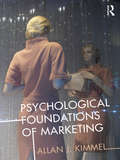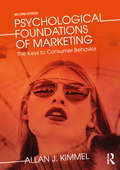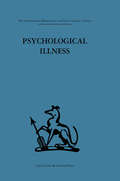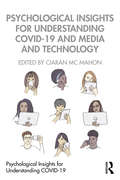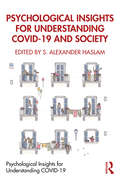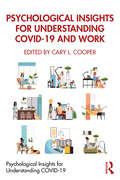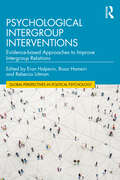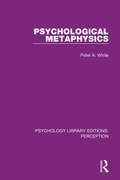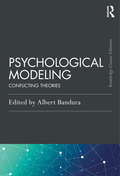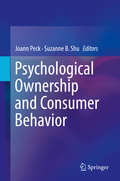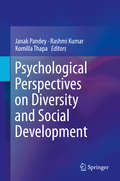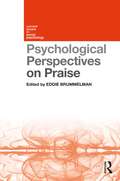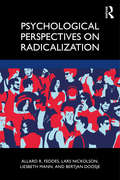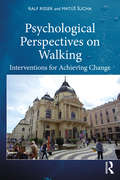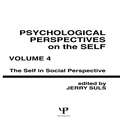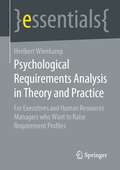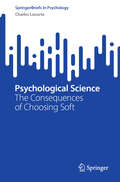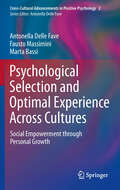- Table View
- List View
Psychological Empowerment and Job Satisfaction in the Banking Sector
by Elizabeth George Zakkariya K. A.This book explores how psychological empowerment can influence and enhance job satisfaction. The authors argue that in today’s working climate the wellbeing and involvement of employees is of utmost importance to any company’s overall success and that management techniques like empowerment are the most effective means of achieving this goal. Based on an empirical study examining job satisfaction amongst employees of several private sector, public sector and new generation banks in Kerala, India as well as extensive literature review, this book discusses the role psychological empowerment plays in enhancing job satisfaction both locally and internationally. It goes on to analyze four dimensions of psychological empowerment and the role of job satisfaction in the relationship between psychological empowerment and job related stress. This book will be of great interest to scholars in management and psychology and is essential reading for industrialists and managers wanting to apply empowerment strategies in their own workplace.
Psychological Foundations of Marketing
by Allan J. KimmelA CHOICE Outstanding Academic Title 2013! Are we influenced by ads even when we fast-forward them? Do brands extend our personalities? Why do we spend more when we pay with a credit card? Psychological Foundations of Marketing considers the impact of psychology on marketing practice and research, and highlights the applied aspects of psychological research in the marketplace. This book presents an introduction to both areas, and provides a survey of the various contributions that psychology has made to the field of marketing. Each chapter considers a key topic within psychology, outlines the main theories, and presents various practical applications of the research. Topics covered include: Motivation: The human needs at the root of many consumer behaviors and marketing decisions. Perception: The nature of perceptual selection, attention and organization and how these perceptual processes relate to the evolving marketing landscape. Decision making: How and under what circumstances it is possible to predict consumer choices, attitudes and persuasion? Personality and lifestyle: How insight into consumer personality can be used to formulate marketing plans. Social behavior: The powerful role of social influence on consumption. This book will be of great interest to a diverse audience of academics, students and professionals, and will be essential reading for courses in marketing, psychology, consumer behavior and advertising.
Psychological Foundations of Marketing: The Keys to Consumer Behavior
by Allan J KimmelThis is the only textbook to provide an applied, critical introduction to the role of psychology in marketing, branding and consumer behavior. Ideally suited for both students and professionals, the new edition is a complete primer on how psychology informs and explains marketing strategies, and how consumers respond to them. The book provides comprehensive coverage of: Motivation: the human needs at the root of many consumer behaviors and marketing decisions. Perception: the nature of perceptual selection, attention, and organization and how they relate to the evolving marketing landscape. Decision making: how and under what circumstances it is possible to predict consumer choices, attitudes, and persuasion. Personality and lifestyle: how insight into consumer personality can be used to formulate marketing plans. Social behavior: the powerful role of social influence on consumption. Now featuring case studies throughout to highlight how psychological research can be applied in the marketplace, and insightful analysis of the role of digital media and new technologies, this award-winning textbook is required reading for anyone interested in this fascinating and evolving subject.
Psychological Illness: A community study
by E J R PrimroseTavistock Press was established as a co-operative venture between the Tavistock Institute and Routledge & Kegan Paul (RKP) in the 1950s to produce a series of major contributions across the social sciences. This volume is part of a 2001 reissue of a selection of those important works which have since gone out of print, or are difficult to locate. Published by Routledge, 112 volumes in total are being brought together under the name The International Behavioural and Social Sciences Library: Classics from the Tavistock Press. Reproduced here in facsimile, this volume was originally published in 1962 and is available individually. The collection is also available in a number of themed mini-sets of between 5 and 13 volumes, or as a complete collection.
Psychological Insights for Understanding COVID-19 and Media and Technology (Psychological Insights for Understanding COVID-19)
by Ciarán Mc MahonIn the Psychological Insights for Understanding COVID-19 series, international experts introduce important themes in psychological science that engage with people’s unprecedented experience of the pandemic, drawing together chapters as they originally appeared before COVID-19 descended on the world. This book explores how COVID-19 has impacted our relationship with media and technology, and chapters examine a range of topics including fake news, social media, conspiracy theories, belonging, online emotional lives and relationship formation, and identity. It shows the benefits media and technology can have in relation to coping with crises and navigating challenging situations, whilst also examining the potential pitfalls that emerge due to our increasing reliance on them. In a world where the cyberpsychological space is constantly developing, this volume exposes the complexities surrounding the interaction of human psychology with media and technology, and reflects on what this might look like in the future. Featuring theory and research on key topics germane to the global pandemic, the Psychological Insights for Understanding COVID-19 series offers thought-provoking reading for professionals, students, academics and policy makers concerned with the psychological consequences of COVID-19 for individuals, families and society.
Psychological Insights for Understanding COVID-19 and Society (Psychological Insights for Understanding COVID-19)
by S. Alexander HaslamIn the Psychological Insights for Understanding COVID-19 series, international experts introduce important themes in psychological science that engage with people’s unprecedented experience of the pandemic, drawing together chapters as they originally appeared before COVID-19 descended on the world. This book explores how COVID-19 has impacted society, and chapters examine a range of societal issues including leadership and politics, community, social status, welfare, social exclusion and accountability. Addressing the social and psychological processes that structure, and are structured by, our social contexts, it shows not only how groups and individuals can come together to manage global crises, but also how these crises can expose weaknesses in our society. The volume also reflects on how we can work together to rebuild society in the aftermath of the pandemic, by cultivating a shared sense of responsibility through social integration and responsible leadership. Showcasing theory and research on key topics germane to the global pandemic, the Psychological Insights for Understanding COVID-19 series offers thought-provoking reading for professionals, students, academics and policy makers concerned with the psychological consequences of COVID-19 for individuals, families and society.
Psychological Insights for Understanding COVID-19 and Work (Psychological Insights for Understanding COVID-19)
by Cary L. CooperIn the Psychological Insights for Understanding COVID-19 series, international experts introduce important themes in psychological science that engage with people’s unprecedented experience of the pandemic, drawing together chapters as they originally appeared before COVID-19 descended on the world. This timely and accessible book brings together a selection of chapters offering insights into issues surrounding work and the COVID-19 pandemic. Featuring content on topics such as health and wellbeing, work-family, flexible hours, organisational communication, talent management, recovery from work, employee engagement and flourishing, burnout, and organisational interventions, the book includes a specially written introduction contextualising the chapters in relation to the COVID-19 crisis. Reflecting on how psychological research is relevant during a significant global event, the introduction examines the potential future impact of the pandemic on the practice and study of psychology and our lives more generally. Featuring theory and research on key topics germane to the global pandemic, the Psychological Insights for Understanding COVID-19 series offers thought-provoking reading for professionals, students, academics and policy makers concerned with the psychological consequences of COVID-19 for individuals, families and society.
Psychological Insights on the Role and Impact of the Media During the Pandemic: Lessons from COVID-19
by Barrie GunterThis volume places the spotlight on the role different media and communications systems played in informing the public about the pandemic, shaping their views about what was happening and contributing to behavioural compliances with pandemic-related restrictions. Throughout the pandemic, media coverage has played an important role in drawing attention to specific messages, influencing public risk perceptions and fear responses. Mainstream media and other electronic communication systems such as Facebook and WhatsApp have been pivotal in getting pandemic information out to the public, thereby influencing their beliefs, attitudes and behaviour and engaging them generally in the pandemic as stakeholders. In this timely volume, author Barrie Gunter considers how people reacted to this coverage and its contribution to their understanding of what was going on, including the influence of fake news and misinformation on public beliefs about the pandemic, from anti-lockdown protests to the "anti-vaxx" movement. In addition, looking at how government messaging was not always consistent or clear and how different authorities were found not always to be in harmony or compliance with the messages they put out, Gunter examines the harm done by presenting different publics with ambiguous or conflicting narratives. Drawing out important communications strategy lessons to be learned for the future, this is essential reading for students and researchers in psychology, public health and medical sciences and for policymakers who assess government strategies, responses and performance.
Psychological Intergroup Interventions: Evidence-based Approaches to Improve Intergroup Relations (Global Perspectives in Political Psychology)
by Eran Halperin Boaz Hameiri Rebecca LittmanThis book introduces a comprehensive and integrative collection of psychological intergroup interventions. These evidence-based interventions are scientifically established and tested in several real-world contexts of intergroup animosities and tensions, from prejudice and inequality reduction to peace promotion. Intergroup hostility, violence, and discrimination have become more and more prevalent in recent decades. To address this challenge, recently, social scientists have shown an increasing shift from a descriptive to a more interventionist science, developing evidence-based interventions to improve intergroup relations. For the first time, this book includes research on intergroup interventions and their applications to the field, from a global collection of leading voices in the discipline. It also includes a conceptualization of intergroup interventions, a typology of different types of interventions, as well as a guideline for effective development of intergroup interventions. Each chapter focuses on one psychological intergroup intervention, further reviewing a sample of relevant platforms such as education, entertainment, and VR, upon which psychological intergroup interventions can be implemented. With each chapter featuring both intervention research and practical advice for practitioners, this is the ideal companion for researchers and professionals in social psychology, sociology, politics, peace studies and conflict resolution. It will also be of interest to practitioners looking for practical advice to create an impact in the real-world.
Psychological Knowledge and Practices in Brazilian Colonial Culture (Latin American Voices)
by Marina MassimiThis book examines the complexities of the colonization of the territory that is now Brazil and its shaping of psychological knowledge and practice. It reveals the rich network of cultural practices that were formed through the appropriation of elements of Jesuit Catholicism and the blending with elements of the cultures of native, African and Lusitanian populations present in the territory, and how psychological concepts and practices emerged and circulated between the sixteenth and the late eighteenth centuries, long before the establishment of psychology as a modern science. The volume summarizes the research program developed by the author over 38 years of academic activity through which she contributed to expand the field of historical studies in psychology by investigating how psychological concepts and practices were produced in cultural and historical contexts different from the European and North American societies where scientific psychology developed in the 19th and 20th centuries. Psychological Knowledge and Practices in Brazilian Colonial Culture will be of interest not only to historians of psychology, but also to professional psychologists working with culturally diverse populations who seek to understand how psychological concepts and phenomena are shaped by culture. By doing so, the book intends to contribute to the development of a psychology better prepared to deal with cultural diversity in an increasingly multicultural world. “Massimi’s book will now form an important foundation of English-language scholarship about the psychological and cultural impact of colonization on subjugated peoples. She has, of course, made many such contributions in Portuguese. It is to be hoped that much of her work will be translated into English so that more scholars may benefit from the richness of her insights.” – Excerpt from the Foreword by Dr. Wade E. Pickren.
Psychological Metaphysics (Psychology Library Editions: Perception #33)
by Peter A. WhiteThe research literature on causal attribution and social cognition generally consists of many fascinating but fragmented and superficial phenomena. These can only be understood as an organised whole by elucidating the fundamental psychological assumptions on which they depend. Originally published in 1993, Psychological Metaphysics is an exploration of the most basic and important assumptions in the psychological construction of reality, with the aim of showing what they are, how they originate, and what they are there for. Peter A. White proposes that people basically understand causation in terms of stable, specific powers of things operating to produce effects under suitable conditions. This underpins an analysis of people’s understanding of causal processes in the physical word and of human action, which makes a radical break with the Heiderian tradition. Psychological Metaphysics suggests that causal attribution is in the service of the person’s practical concerns and any interest in accuracy or understanding is subservient to this. A notion of regularity in the world is of no more than minor importance in causal attribution, and social cognition is not so much a matter of cognitive mechanisms or processes but more of cultural ways of thinking imposed upon tacit, unquestioned, universal assumptions. Psychological Metaphysics incorporates not only research and theory in social cognition and developmental psychology, but also philosophy and the history of ideas. It will be challenging to everyone interested in how we try to understand the world.
Psychological Modeling: Conflicting Theories (Psychology Press & Routledge Classic Editions)
by Albert BanduraThe Classic Edition of this key text highlights seminal work done in the subject of learning by modeling and offers an extensive review of the major theories, edited by one of the most influential psychologists of his generation. In his introductory essay, Bandura identifies the most important controversial issues in the field of observational learning and reviews a large body of research findings, before carefully chosen articles, written by a team of expert contributors, tackle a range of key debates in the field. Topics explored include the role of reinforcement play in observational learning, the scope of modeling influences, the types of people most susceptible to modeling influences, and the relative effectiveness of models presented in live action, in pictorial presentations, or through verbal description. Written in a lively and engaging manner, this book will be of interest to all psychology students interested in psychological modeling, as well as educators and professionals working with children.
Psychological Ownership and Consumer Behavior
by Joann Peck Suzanne B. ShuThis pathbreaking volume expands on the construct of psychological ownership, placing it in the contexts of both individual consumer behavior and the wider decision-making of consumer populations. An individual’s feeling of ownership toward a target represents the perception that something is “mine!”, and is highly relevant to buying and relating to specific goods, economic and health decision-making and, especially salient given today’s privacy concerns, psychological ownership of digital content and personal data. Experts analyze the social conditions and cognitive processes concerning shared consumer experiences and psychological ownership. Contributors also discuss possibilities for socially responsible forms of psychological ownership using examples from environmental causes, and the behavioral mechanisms involved when psychological ownership becomes problematic, as in cases of hoarding. Included among the topics: Evidence from young children suggesting that even legal ownership is fundamentally psychological. Ownership, the extended self, and the extended object. Psychological ownership in financial decisions. The intersection of ownership and design. Can consumers perceive collective psychological ownership of an organization? Whose experience is it, anyway? Psychological ownership and enjoyment of shared experiences. Psychological ownership as a facilitator of sustainable behaviors including stewardship. Future research avenues in psychological ownership. Psychological Ownership and Consumer Behavior pinpoints research topics and real-world issues that will define the field in the coming years. It will be especially useful in graduate classes in marketing, consumer behavior, policy interventions, and business psychology.
Psychological Perspectives on Diversity and Social Development
by Janak Pandey Rashmi Kumar Komilla ThapaThis book is a collection of essays covering a range of issues related to socioeconomic inequalities and diversities. The authors, leading social scientists of diverse nationalities, represent varied perspectives. The book has essays on multiculturalism, social inclusion and exclusion of minorities and other marginalized groups such as low castes, linguistic minorities, Adivasis (tribals), persons with disability and unemployed youth. The book focuses on some innovative concepts considered necessary to understand the very process and evolution of aspects of social development such as pro-sociality, authentic responsible self and leadership ideology. The book deals with the challenges for achieving social development and societal harmony. The book will be a very useful resource for social science scholars and particularly for social and cultural psychologists, development professionals and administrators interested in the issues related to social development, social diversity and inter-group relations. The book will also be useful for policy formulation and action.
Psychological Perspectives on Financial Decision Making
by Tomasz Zaleskiewicz Jakub TraczykThis book reviews the latest research from psychology, neuroscience, and behavioral economics evaluating how people make financial choices in real-life circumstances. The volume is divided into three sections investigating financial decision making at the level of the brain, the level of an individual decision maker, and the level of the society, concluding with a discussion of the implications for further research. Among the topics discussed:Neural and hormonal bases of financial decision makingPersonality, cognitive abilities, emotions, and financial decisionsAging and financial decision makingCoping methods for making financial choices under uncertaintyStock market crashes and market bubblesPsychological perspectives on borrowing, paying taxes, gambling, and charitable giving Psychological Perspectives on Financial Decision Making is a useful reference for researchers both in and outside of psychology, including decision-making experts, consumer psychologists, and behavioral economists.
Psychological Perspectives on Identity, Religion and Well-Being: Empirical Findings from India
by Girishwar Misra Preeti Kapur Nitin K. VermaThis book takes a social psychological perspective to study the ways in which identity, religious beliefs and well-being are related to and affect each other in the contemporary world. It simultaneously draws upon intellectual resources from the extant interdisciplinary literature to build connections within the broader societal context. In view of the social diversity and changes in post-globalization India, issues of identity, religion and well-being emerge as dynamic and vibrant aspects of social reality in both individual and group contexts, across age groups and genders. The current social-cultural-political scenario in the India, therefore, points to the need to investigate the outcome of personal and social well-being in relation to identity and religion. As contexts change, these issues take different shades and influence human conditions differentially. This book undertakes the investigation by going beyond the traditional tropes of behavioral science and discussing the dynamic interplay and confluence of socio-cultural-political variables in changing times. It draws from a large sample from the four major religious faiths in India—Hinduism, Islam, Christianity and Sikhism—and enables readers to understand significant interactions among facets of identity (personal and social), religious beliefs and practices and well-being (personal and social) with age and gender in an important segment of the global population.
Psychological Perspectives on Praise
by Eddie BrummelmanPraise is perhaps the most widely used technique to influence others. When used appropriately, praise can motivate people, make them feel better, and improve their social relationships. Often, however, praise fails to work as intended and may even cause harm. Psychological Perspectives on Praise reviews and integrates psychological theory and research to provide an overarching perspective on praise. With contributions from leading scholars in the field, this book amalgamates diverse theoretical and empirical perspectives on praise. The book starts with providing an overview of prominent theories that seek to explain the effects of praise, including self-enhancement theory, self-verification theory, attribution theory, and self-determination theory. It then discusses several lines of empirical research on how praise impacts competence and motivation, self-perceptions (e.g., self-esteem and narcissism), and social relationships. It does so in a range of contexts, including children’s learning at school, employees’ commitment at work, and people’s behavior within romantic relationships. The book concludes by showing how praise can be understood in its developmental and cultural context. Revealing that praise is a message rich in information about ourselves and our social environments, this book will be of interest to social, organizational, personality, developmental, and educational psychologists; students in psychology and related disciplines; and practitioners including teachers, managers, and counselors who use praise in their daily practice.
Psychological Perspectives on Radicalization
by Bertjan Doosje Allard R. Feddes Lars Nickolson Liesbeth MannThis innovative book examines radicalization from new psychological perspectives by examining the different typologies of radicalizing individuals, what makes individuals resilient against radicalization, and events that can trigger individuals to radicalize or to deradicalize. What is radicalization? Which psychological processes or events in a person's life play a role in radicalization? What determines whether a personal is resilient against radicalization, and is deradicalization something that we can achieve? This book goes beyond previous publications on this topic by identifying concrete key events in the process of radicalization, providing a useful theoretical framework that summarizes the current state-of-the-art research on radicalization and deradicalization. A model is presented in which a distinction is made between different levels of radicalization and deradicalization, with key underlying psychological needs discussed: the need for identity, justice, significance, and sensation. The authors also describe what makes people resilient against messages from "the outside world" when they belong to an extremist group and discuss observable events which may "trigger" a person to radicalize (further) or to deradicalize. Including real-world examples and clear guidelines for interventions aimed at prevention of radicalization and stimulation of deradicalization, this is essential reading for policy makers, researchers, practitioners, and students interested in this crucial societal issue.
Psychological Perspectives on Religion and Religiosity
by Benjamin Beit-HallahmiIs religion to blame for deadly conflicts? Should religious behaviour be credited more often for acts of charity and altruism? In what ways are religious and ‘spiritual’ ideas, practices and identities surviving and changing as religion loses its political power in those parts of the world which are experiencing increasing secularization? Written by one of the world’s leading authorities on the psychology of religion and social identity, Psychological Perspectives on Religion and Religiosity offers a comprehensive and multidisciplinary review of a century of research into the origins and consequences of religious belief systems and religious behaviour. The book employs a unique theoretical framework that combines the ‘new’ cognitive-evolutionary psychology of religion, examining the origins of religious ideas, with the ‘old’ psychology of religiosity, which looks at correlates and consequences. It examines a wide range of psychological variables and their relationship with religiosity. It is also provides fresh insights into classical topics in the psychology of religion, such as religious conversion, the relevance of Freud’s ideas about religion and religiosity, the meaning of secularization, and the crucial role women play in religion. The book concludes with the author’s reflections on the future for the psychology of religion as a field. Psychological Perspectives on Religion and Religiosity will be invaluable for academic researchers in psychology, sociology, anthropology, political science, economics, and history worldwide. It will also be of great interest to advanced undergraduate students and graduate students across the social sciences.
Psychological Perspectives on Risk and Risk Analysis: Theory, Models, and Applications
by Martina Raue Eva Lermer Bernhard StreicherThis authoritative collection goes beyond economic statistics and probability data to offer a robust psychological understanding of risk perception and risk taking behavior. Expert contributors examine various risk domains in life, and pinpoint cognitive, emotional, and personality factors contributing to individual differences in risk taking as well as the many nuances social demographics (e.g., culture, gender) bring to risk decisions. Coverage takes competing theories and studies into account to identify mechanisms involved in processing and acting on uncertainty. And implications and applications are demonstrated in varied fields, from updated risk models for the insurance sector to improved risk communication in health services to considering risk perception in policy decisions. A sampling of the topics: Personality and risk: beyond daredevils—risk taking from a temperament perspective.Cognitive, developmental, and neurobiological aspects of risk judgments.The group effect: social influences on risk identification, analysis, and decision-making.Cognitive architectures as a scaffolding for risky choice models.Improving understanding of health-relevant numerical information.Risk culture as a framework for improving competence in risk management. Psychological Perspectives on Risk and Risk Analysis will be of great interest to researchers in and outside of psychology, including decision-making experts and behavioral economists. Additionally, this volume will appeal to practitioners who often have to make risky decisions, such as managers and physicians.
Psychological Perspectives on Walking: Interventions for Achieving Change
by Ralf Risser Matúš ŠuchaPsychological Perspectives on Walking provides a comprehensive overview of the benefits of walking and shows how we can encourage people to walk more based on psychological principles. It examines how walking significantly improves health, positively impacts the environment, contributes to resolving social issues, and boosts the local micro-economy. This pioneering book discusses psychological motivations for walking versus not walking and asserts research-based arguments in favour of walking, including both theoretical considerations and everyday concerns. The book investigates the motivations that can lead to increased walking, advises on how to build walking-conducive habits, and recommends strategies for decision makers for promoting changes that will allow walking to thrive more easily. The authors include success stories and lessons learned from what have become known as 'walkable' cities to show how interventions and initiatives can succeed on a practical basis. This accessible, practical book is essential for urban planners; health specialists; policy makers; traffic experts; psychology, civil engineering, and social sciences students; and experts in the field of sustainable mobility. Psychological Perspectives on Walking will appeal to anyone in the general population in favour of a sustainable and healthy lifestyle.
Psychological Perspectives on the Self, Volume 4: the Self in Social Perspective
by Jerry SulsThe primary aim of this volume is to present the most recent advances in the psychological study of the self with a special emphasis on the factors that contribute to self-concept and self-esteem. This volume offers the following features: * state-of-the-art testimonies of important new research programs on the self * valuable reviews and literature on measurement of self-concept * analysis of sociocultural influences on self -- an understudied topic until recently * new theory on the origins of self-enhancement
Psychological Requirements Analysis in Theory and Practice: For Executives and Human Resources Managers who Want to Raise Requirement Profiles (essentials)
by Heribert WienkampPsychological requirement analyses with their requirement and qualification profiles show what will be important at work in the future! Both the selection of applicants and the training of personnel, as was the case, for example, in view of new strategic challenges in the financing business of a bank, should benefit from this information, which is to be collected in advance by means of a mix of methods, e.g., questionnaires and "expert interviews" on site. Selected key personnel figures from operational HR work should be used to check whether the current HR strategy is "still on track".This Springer essential is a translation of the original German 1st edition essentials, Psychologische Anforderungsanalysen in Theorie und Praxis by Heribert Wienkamp, published by Springer Fachmedien Wiesbaden GmbH, part of Springer Nature in 2020. The translation was done with the help of artificial intelligence (machine translation by the service DeepL.com). A subsequent human revision was done primarily in terms of content, so that the book will read stylistically differently from a conventional translation. Springer Nature works continuously to further the development of tools for the production of books and on the related technologies to support the authors.
Psychological Science: The Consequences of Choosing Soft (SpringerBriefs in Psychology)
by Charles LocurtoThis book examines questions of experimental design, in social science principally concerning what happens if shortcuts are allowed in the design, analysis, and interpretation of psychological research. The author argues that shortcuts lead to experimental results that are of low power and lack the precision that should be afforded experimental work. Consequently, it should not be surprising that psychological science has difficulty replicating its findings. A more specialized focus is the lack of success of self-esteem training techniques despite their widespread usage. The failure of self-esteem training is contrasted with the success of work that involves the use of standardized testing procedures and scores, such as IQ. From this perspective, while self-esteem and IQ testing have been each proposed as Hole Grails, meaning that they constitute comprehensive influences on many aspects of behavior, only IQ can function in this manner. It is also argued that some areas of social science, particularly unconscious bias, have not been subjected to sufficient critical scrutiny, and therefore are associated with rather weak empirical profiles that do not justify the popularity of the procedures. Throughout the book, the work habits of modern scientists are contrasted with those of one of science’s most successful practitioners, Charles Darwin, and to a lesser extent, Sigmund Freud. Contrasts between the historically-validated work of Darwin on the one hand, and modern psychological science, suggest avenues of methodological improvement in the practice of modern psychological science.
Psychological Selection and Optimal Experience Across Cultures
by Antonella Delle Fave Fausto Massimini Marta BassiWhat does Western science know about the relationship between individual well-being and cultural trends? What can learn from other cultural traditions? What do the recent advancements in positive psychology teach us on this issue, particularly the eudaimonic framework, which emphasizes the connections between personal well-being and social welfare? People grow and live in cultures that deeply influence their values, aspirations and behaviors. However, individuals in their turn play an active role in building their own goals, growth trajectories and social roles, at the same time influencing culture trends. This process, defined psychological selection, is related to the individual pursuit of well-being People preferentially select and cultivate in their lives activities, interests, and relationships associated with optimal experience, a state of deep engagement, concentration, and enjoyment. Several cross-cultural studies confirmed the positive and rewarding features of optimal experience. Based on these evidences, this book offers a new perspective in the study of human behavior. Highlighting the interplay between individual and cultural growth trajectories, it conveys a core message: educating people to enjoy engagement and involvement in activities that can be relevant and meaningful for social welfare is a premise to foster the harmonious development of human communities, and the peaceful cohabitation of cultures.

